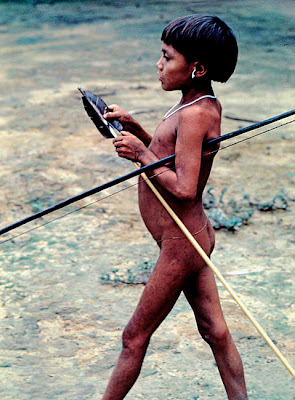Of all the many hundreds of children I have photographed around the world, those of the Yanomami Indians of the Amazon rain forest may well be the happiest and freest. They had no toys but for those they built themselves. Only the boys built them, and they were mostly bows and arrows. The children’s games copied their parents’ activities, though on a smaller scale. They learned by watching.
Boys and girls mimicked the presentation dances that a clan offers on arriving at a neighboring yano when invited to share in a harvest in the form of a plantain, or manioc, or peach palm soup. The boys rolled in mud or plunged down from high branches into the Tootobi River. Boys and girls occasionally played war too, but always in good humor. Never did I see a child beat another or even shout at one. On the contrary, the bigger children always cared for the younger ones.
The Yanomami had dogs, and they treated them well. The kids' pets included the young progeny of the animals their fathers had hunted for food--monkeys, sloths, opossums, parrots, and other colorful birds. Those animals would remain pets and die of old age, never to be eaten.
The children under four accompanied their mothers to the forest gardens. An older child sometimes followed them to watch over the younger sibling while the mother dug out manioc, slashed down plantain or bananas, used a long stick to bring down some papayas, or hacked wood for the fire. The younger children also went along on gathering expeditions. On those, several women joined to hunt frogs, sweet-water crabs, termites, grubs, or mushrooms.
The surrounding forest was like you would imagine the biblical Garden of Eden. It was nothing like the Green Hell of some authors. Unless, perhaps, you had wandered through it, lost and hungry for weeks, fearing you would die there alone, like a wounded animal, unable ever to find your way out of it. This happens, of course, But the Indians never get lost in the forest. And they live very comfortably in it, working only an average of two and a half hours a day. I lived comfortably in it myself while in their company.
That was a long time ago. Since then, the Yanomami have seen their land invaded by heavily armed gold miners who have polluted the rivers with mercury and caused many deaths by spreading diseases against which the Indians had no natural defenses. In that way, the Amazon could indeed become a green hell, as it once was, when Indians were enslaved by rubber barons.
For more pictures of Yanomami children, please go to http://pa.photoshelter.com/c/victorenglebert, click on Galleries, and then click on the picture of a Yanomami girl at the bottom of the screen. Clicking on the picture of a Yanomami woman at the top of the screen will open to you the world of the whole Yanomami society.




















